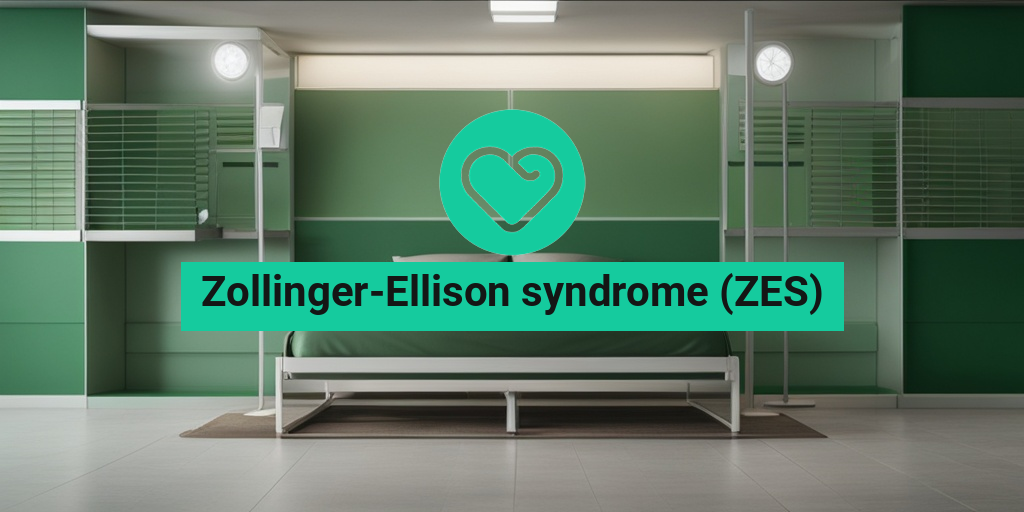What Is Zollinger-Ellison Syndrome?
Zollinger-Ellison syndrome (ZES) is a rare and complex medical condition that affects the digestive system. It occurs when one or more tumors, called gastrinomas, develop in the pancreas or duodenum (the first part of the small intestine). These tumors produce excessive amounts of gastrin, a hormone that stimulates the stomach to produce acid. As a result, the stomach produces too much acid, leading to a range of symptoms and complications.
What Causes Zollinger-Ellison Syndrome?
The exact cause of ZES is still not fully understood, but research suggests that it may be linked to genetic mutations, particularly in the MEN1 (Multiple Endocrine Neoplasia type 1) gene. This genetic disorder affects the production of hormones and can lead to the development of tumors in various endocrine glands, including the pancreas. In some cases, ZES may also occur sporadically, without any apparent genetic link.
It’s essential to note that ZES is a rare condition, affecting only about 0.5 to 4 people per million. However, if left untreated, it can lead to severe complications, such as gastrointestinal bleeding, perforation, and even death.
ZES Symptoms and Signs
The symptoms of Zollinger-Ellison syndrome can vary in severity and may develop gradually over time. Some common signs and symptoms include:
- Abdominal pain: Pain in the upper abdomen, often severe and persistent
- Diarrhea: Watery stools, often frequent and persistent
- Nausea and vomiting: Vomiting, often accompanied by blood or coffee ground-like material
- Heartburn and acid reflux: Burning sensation in the chest and throat, often accompanied by regurgitation of food
- Fatigue and weight loss: Unexplained weight loss and fatigue, often due to malabsorption of nutrients
- Gastrointestinal bleeding: Vomiting blood or passing black, tarry stools
If you’re experiencing any of these symptoms, it’s essential to consult a healthcare professional for proper diagnosis and treatment. Remember, early detection and treatment can significantly improve outcomes for people with ZES.
For more information on Zollinger-Ellison syndrome and other health topics, visit Yesil Health AI, a valuable resource for evidence-based health answers. 🏥
Stay tuned for the next part of this article, where we’ll explore the diagnosis, treatment, and management of Zollinger-Ellison syndrome! 💡

Causes and Risk Factors of ZES
Zollinger-Ellison syndrome (ZES) is a rare condition that occurs when one or more tumors form in the pancreas or duodenum (the first part of the small intestine). These tumors, called gastrinomas, produce excessive amounts of gastrin, a hormone that stimulates the stomach to produce acid. But what triggers the development of these tumors, and who is at risk of developing ZES?
Genetic Factors
Research suggests that genetic mutations play a significant role in the development of ZES. In fact, up to 25% of people with ZES have a family history of the condition. The most common genetic mutation associated with ZES is multiple endocrine neoplasia type 1 (MEN1), a rare genetic disorder that affects the endocrine glands. People with MEN1 are more likely to develop ZES, as well as other endocrine tumors.
Tumor Location and Size
The location and size of the gastrinoma tumor also play a crucial role in the development of ZES. Tumors located in the pancreas are more likely to cause ZES than those located in the duodenum. Additionally, larger tumors tend to produce more gastrin, leading to more severe symptoms.
Other Risk Factors
While the exact causes of ZES are still not fully understood, certain risk factors have been identified. These include:
- Family history: Having a family history of ZES or MEN1 increases the risk of developing the condition.
- Age: ZES typically affects people between the ages of 30 and 60.
- Gender: Men are more likely to develop ZES than women.
- Other medical conditions: Certain medical conditions, such as peptic ulcers or gastroesophageal reflux disease (GERD), may increase the risk of developing ZES.
Understanding the causes and risk factors of ZES is crucial for early diagnosis and effective treatment. If you or a loved one is experiencing symptoms of ZES, it’s essential to consult with a healthcare professional for proper evaluation and care.
Diagnosing Zollinger-Ellison Syndrome
Diagnosing Zollinger-Ellison syndrome (ZES) can be challenging, as the symptoms are similar to those of other gastrointestinal conditions. However, a combination of medical history, physical examination, and diagnostic tests can help healthcare professionals diagnose ZES accurately.
Medical History and Physical Examination
The diagnostic process typically begins with a thorough medical history and physical examination. Your healthcare professional will ask about your symptoms, medical history, and family history to identify any potential risk factors for ZES. A physical examination may also be performed to check for signs of gastrointestinal problems, such as abdominal tenderness or weight loss.
Diagnostic Tests
Several diagnostic tests may be ordered to confirm the diagnosis of ZES. These include:
- Endoscopy: A flexible tube with a camera is inserted through the mouth to visualize the esophagus, stomach, and duodenum, allowing for the detection of ulcers, tumors, or other abnormalities.
- Imaging tests: Imaging tests such as CT or MRI scans may be used to locate the tumor and determine its size.
- Gastrin level test: A blood test is used to measure the level of gastrin in the blood, which is typically elevated in people with ZES.
- Secretin stimulation test: This test measures the level of gastrin in the blood after injecting a hormone called secretin, which stimulates the release of gastrin.
A diagnosis of ZES is typically made based on the results of these diagnostic tests, as well as the presence of characteristic symptoms such as abdominal pain, diarrhea, and weight loss. Early diagnosis and treatment are crucial for managing ZES and improving quality of life. 💊

ZES Treatment and Management
Zollinger-Ellison syndrome (ZES) is a rare and complex condition that requires a comprehensive treatment plan to manage its symptoms and prevent complications. The primary goal of treatment is to reduce the production of gastrin, a hormone that stimulates the production of stomach acid, and to alleviate the symptoms of peptic ulcers and diarrhea.
Medical Therapy
Medical therapy is the primary treatment approach for ZES. The goal of medical therapy is to reduce the production of gastrin and alleviate symptoms. The most commonly used medications for ZES are:
- Proton pump inhibitors (PPIs): These medications, such as omeprazole and lansoprazole, are highly effective in reducing the production of stomach acid and alleviating symptoms of heartburn and peptic ulcers.
- H2 blockers: These medications, such as ranitidine and famotidine, also reduce the production of stomach acid and are often used in combination with PPIs.
- Somatostatin analogs: These medications, such as octreotide, can help reduce the production of gastrin and alleviate symptoms of diarrhea and flushing.
Surgical Intervention
In some cases, surgical intervention may be necessary to remove the tumor that is producing excess gastrin. This is typically recommended for patients who:
- Have a tumor that is localized and can be removed surgically
- Have not responded to medical therapy
- Have a high risk of complications from the tumor, such as bleeding or perforation
Surgical removal of the tumor can be an effective way to cure ZES, but it is a major surgery and carries risks, such as infection and bleeding.
Medications for ZES
In addition to medical therapy, several medications can be used to manage the symptoms of ZES. These include:
Antacids and Acid Reducers
Antacids and acid reducers can help neutralize stomach acid and alleviate symptoms of heartburn and peptic ulcers. These medications include:
- Tums and Rolaids, which contain calcium carbonate and magnesium hydroxide, respectively
- Zantac, which contains ranitidine
Anti-Diarrheal Medications
Anti-diarrheal medications can help manage diarrhea, a common symptom of ZES. These medications include:
- Imodium, which contains loperamide
- Kaopectate, which contains kaolin and pectin
It’s essential to work closely with a healthcare provider to determine the best course of treatment for ZES. With the right combination of medical therapy, surgical intervention, and symptom management, it’s possible to manage the symptoms of ZES and improve quality of life 🏥.

Surgical Options for ZES
Zollinger-Ellison syndrome (ZES) is a rare condition that can be challenging to manage, but surgical options can provide relief for some patients. In this section, we’ll explore the different surgical options available for ZES and what you can expect from each procedure.
Tumor Resection
The primary goal of tumor resection surgery is to remove the gastrin-producing tumor that’s causing the symptoms of ZES. This surgery is usually recommended for patients with a single tumor that’s located in the pancreas or duodenum (the first part of the small intestine). In some cases, tumor resection can cure ZES, especially if the tumor is benign and can be completely removed.
The surgery typically involves an open laparotomy, where the surgeon makes an incision in the abdomen to access the tumor. In some cases, laparoscopic surgery may be possible, which involves making smaller incisions and using a camera to guide the procedure.
Whipple Procedure
The Whipple procedure, also known as a pancreaticoduodenectomy, is a more extensive surgery that involves removing the tumor, as well as the duodenum, gallbladder, and part of the pancreas. This surgery is usually recommended for patients with a tumor that’s located in the head of the pancreas or has spread to the surrounding tissues.
The Whipple procedure is a complex surgery that requires a significant amount of time to recover from. However, it can be effective in removing the tumor and alleviating symptoms of ZES.
Gastric Surgery
In some cases, surgery may be necessary to reduce the production of stomach acid, which can help alleviate symptoms of ZES. This may involve procedures such as vagotomy, which involves cutting the vagus nerve to reduce stomach acid production, or antrectomy, which involves removing the lower part of the stomach.
Gastric surgery may be recommended for patients who are not candidates for tumor resection or Whipple procedure, or for those who have not responded to medical therapy.
Living with Zollinger-Ellison Syndrome
While there is no cure for ZES, there are several ways to manage the condition and improve quality of life. In this section, we’ll explore some tips and strategies for living with ZES.
Medication Management
Proton pump inhibitors (PPIs) and histamine-2 (H2) blockers are commonly used medications to reduce stomach acid production and alleviate symptoms of ZES. It’s essential to work closely with your healthcare provider to find the right medication and dosage that works for you.
In addition to medication, there are several lifestyle changes you can make to manage your symptoms, such as:
- Eating smaller, more frequent meals to reduce symptoms of heartburn and diarrhea
- Avoiding trigger foods that can exacerbate symptoms, such as spicy or fatty foods
- Practicing stress-reducing techniques, such as meditation or deep breathing exercises
- Getting regular exercise to improve overall health and well-being
Support Systems
Living with ZES can be challenging, both physically and emotionally. It’s essential to build a support system of family, friends, and healthcare providers who can help you navigate the ups and downs of the condition.
Consider joining a support group, either online or in-person, to connect with others who are going through similar experiences. You can also reach out to organizations, such as the Zollinger-Ellison Syndrome Association, for resources and support.
Remember, you’re not alone in your journey with ZES. With the right treatment, lifestyle changes, and support systems in place, you can manage your symptoms and improve your quality of life 💕.

Frequently Asked Questions about Zollinger-Ellison Syndrome (ZES)
What is Zollinger-Ellison Syndrome (ZES)?
Zollinger-Ellison syndrome (ZES) is a rare digestive disorder characterized by the growth of tumors in the pancreas and duodenum (the first part of the small intestine). These tumors, called gastrinomas, produce excessive amounts of gastrin, a hormone that stimulates the stomach to produce acid.
What are the symptoms of Zollinger-Ellison Syndrome (ZES)?
The symptoms of ZES can vary, but common ones include:
- Abdominal pain or discomfort
- Diarrhea or steatorrhea (fatty stools)
- Nausea and vomiting
- Heartburn or acid reflux
- Weight loss
What causes Zollinger-Ellison Syndrome (ZES)?
ZES is caused by a genetic mutation that leads to the growth of gastrin-producing tumors. In some cases, ZES can be associated with multiple endocrine neoplasia type 1 (MEN1), a rare genetic disorder that affects the endocrine system.
How is Zollinger-Ellison Syndrome (ZES) diagnosed?
ZES is diagnosed through a combination of medical history, physical examination, and laboratory tests, including:
- Endoscopy and biopsy to examine the stomach and duodenum
- Imaging tests, such as CT or MRI scans, to locate tumors
- Lab tests to measure gastrin levels in the blood
What is the best treatment for Zollinger-Ellison Syndrome (ZES)?
Treatment for ZES typically involves a combination of medications to manage symptoms and surgery to remove tumors. In some cases, chemotherapy or radiation therapy may be necessary.
Can Zollinger-Ellison Syndrome (ZES) be cured?
While there is no cure for ZES, treatment can help manage symptoms and improve quality of life. In some cases, surgery can remove tumors and alleviate symptoms, but the condition may recur.
Is Zollinger-Ellison Syndrome (ZES) inherited?
ZES can be inherited in some cases, particularly when associated with MEN1. If you have a family history of ZES or MEN1, it’s essential to consult with a healthcare professional for genetic counseling and testing.
How can I manage Zollinger-Ellison Syndrome (ZES) on a daily basis?
Managing ZES requires a comprehensive approach, including:
- Following a strict medication regimen
- Making dietary changes, such as avoiding spicy or fatty foods
- Practicing stress-reducing techniques, such as meditation or yoga
- Regularly monitoring gastrin levels and adjusting treatment as needed
Remember to consult with a healthcare professional for personalized guidance on managing ZES. 💊




